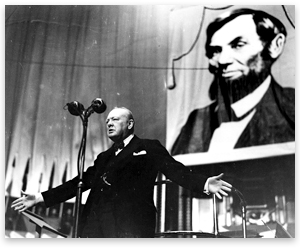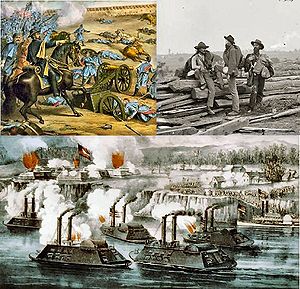Gab@StFerdinandIII - https://unstabbinated.substack.com/
Plenty of cults exist - every cult has its 'religious dogma', its idols, its 'prophets', its 'science', its 'proof' and its intolerant liturgy of demands. Cults everywhere: Corona, 'The Science' or Scientism, Islam, the State, the cult of Gender Fascism, Marxism, Darwin and Evolution, Globaloneywarming, Changing Climate, Abortion...
Tempus Fugit Memento Mori - Time Flies Remember Death


In his career Churchill defended Parliamentary democracy and accountability more than any other politician. A belief in freedom, responsibility, and the efficacy of representative government, made Churchill rather unique amongst most politicians, many of whom even today, are in practice either unable to unwilling to defend with concrete actions and policies these ideals. Yet even Churchill could have his lucidity blinded by romantic prejudice.
A case in point is the American South. It was no secret that the British elite openly sympathized with the degenerate slave-owning society of the US South, during the American Civil War. Only 5 % of Southern whites owned slaves, with many blacks working on huge plantations owned by very rich families. The South was in the main a collection of illiterates; violent, un-developed, and engaged in an immoral enterprise which must have had deep social and psychological effects on its members. For whatever reason, the British elite felt common cause with the Southerners. Part of this emotional attachment was economic - the English economy was dependent in part on Southern cotton, though by the mid 19th century Indian cotton was far more important; - and romantic, with the Southern land owning aristocracy sharing many similar traits and attitudes as the English barons and owners of property.
Churchill knew that the North's victory was an important one in the forward development of civilization. The right side, the right culture, and the right society won. But he like all British elites, for reasons which mix the psychological with the irrationally emotional, felt that the disappearance of the South was not in total, a positive. That something had been lost. He makes the claim – rather oddly – that the Reconstruction of the South post – bellum, was a colossal disaster. It wasn't. Given the fact that Southerners, even after losing the bloody conflict, still wanted enforced apartheid, and racial discrimination, it is hard to see what else the North could have done except impose military rule, and forcibly push through both legally and Constitutionally the guarantees which allowed Blacks to be considered the same as a white man. Churchill however expresess the following:
“Fraud, extravagance, and a humiliating racial policy were imposed upon the South by radical rule. It could be maintained only by the drastic use of Federal power. To bolster up the 'carpet bag' Governments Congress initiated the Fifteenth Amendment, which laid down that suffrage could not be denied to any citizen on grounds of 'race, colour, or previous condition of servitude.'....both by legal methods and by threats to negro voters from secret societies like the Ku Klux Klan, to overthrow the 'carpet bag' Governments and restore white supremacy.”
“But it was on the whole a shameful and discreditable episode.”
It is hard to argue that the 15th Amendment was unnecessary. The US Civil War was a bitter one, and the flames of Southern hate and cultural differences still burnt strongly after 1865. There was little choice but to enforce the Constitution and the laws of the land, by force – including having Blacks in positions of major political and bureaucratic power throughout the South:
“The South was divided into five military districts, each under the command of a Federal Major General. The former Confederacy was to be subjected to Army rule of the kind that Cromwell had once imposed on England. In order to be readmitted into the Union the Southern states were now required to ratify the Fourteenth Amendment and to frame state constitutions which provided for negro suffrage – and this in spite of the fact that very few of the Northern states had as yet granted the negro the vote.”
The Black vote was safeguarded in the 15th Amendment, as was the civil rights of all individuals within America in the 14th. Churchill seems rather curiously critical of the 14th Amendment, assigning its creation to 'Radicals' – an often used term by historians to describe those who wanted a 'firm' and forceful reconstruction of the South by the North, in which Northern laws and culture would be foisted upon the Southern states and forcible change from a slave economy to a modern economy enacted. It is hard to see what is 'radical' about so sensible an idea. You fight wars to win the conflict and the peace;
“The Civil Rights Bill was repassed over Johnson's veto and became law. The Radicals meanwhile aimed a making doubly sure of their purposes by incorporating its provisions in the Fourteenth Amendment.”
The US is much better off with the 14th and 15th Amendments [though illegals having babies as 'anchors' to citizenship is abridging the 14th and distorting its true intention]. The Civil War as Churchill stated was a necessary war – one borne out of an inevitable conflict between the barbaric and the civilized. Thankfully for the world, civilization won.
Churchill's Southern proclivities were clearly displayed in a 'What If' article he wrote during the 1930s. In this fantasy Lee had won at Gettysburg; emancipated all the slaves; and forced Lincoln to sue for peace from New York. He goes from there to conclude that history would have unfolded differently and that perhaps even the World Wars would have been avoided. His 'What if' was, 'What If Lee had lost at Gettysburg?' The benefices of a Southern victory are outlined, and the blandishments of international war arise, apparently, from the Northern victory.
Churchill knew that the North's victory was a key event in the West. In fact it can be stated that the Northern victory was the most important event in North America outside of the British defeat of the French. Without it, the world would be a far different, and sorrier place. The entire nexus of modern conveniences, freedoms, and trade have all emanated in large part, from the cultural-socio and political complex of the Northern states. Even Churchill, the Southernophile, accepts this:
“Thus ended the great American Civil War, which must upon the whole be considered the noblest and least avoidable of all the great mass-conflicts of which till then there was record. Three quarters of a million men had fallen on the battlefield. The North was plunged in debt; the South was ruined. The material advance of the United States was cast back for a spell. The genius of America was impoverished by the alienation of many as of the parent elements in the life and history of the Republic.”
From the ruins and carnage of Civil War the Americans rose to greater heights. The articles and faith of the Declaration of Independence and the Bill of Rights had been upheld. A barbarism was crushed. Modernity could now continue its march forward. Churchill to his credit recognized this, notwithstanding his curious and rather deformed sympathy for the South.